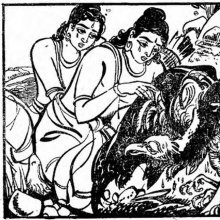Rebuke, Rebuked, Rebuking: 1 definition
Introduction:
Rebuke means something in Hinduism, Sanskrit. If you want to know the exact meaning, history, etymology or English translation of this term then check out the descriptions on this page. Add your comment or reference to a book if you want to contribute to this summary article.
Images (photo gallery)
In Hinduism
Shaktism (Shakta philosophy)
Source: ORA: Amanaska (king of all yogas): (shaktism)Rebuke (directed against a particular religion) is denoted by the Sanskrit term Abhinindaka, according to the 17th century Kaulagajamardana (“crushing the Kaula elephant”) authored by Kāśīnātha or Kṛṣṇānandācala.—Accordingly, [as Īśvara said to Pārvatī]: “Listen, O Pārvatī, I shall give a critique of the Pāṣaṇḍas. Knowing this, a wise man is not defeated by them. Those devoted to fake observances; those who rebuke the religion of the Vedas (vedadharma-abhinindaka); those who have fallen from caste and religious duties; those who have erred and think themselves learned, they are [all] called Pāṣaṇḍas [because] they act contrary to [true] religion. They fall into a terrifying hell until the end of the world. [...]”

Shakta (शाक्त, śākta) or Shaktism (śāktism) represents a tradition of Hinduism where the Goddess (Devi) is revered and worshipped. Shakta literature includes a range of scriptures, including various Agamas and Tantras, although its roots may be traced back to the Vedas.
See also (Relevant definitions)
Query error!
Full-text (+422): Vagdanda, Tarjana, Mut, Niggahaka, Tittuvay, Garjana, Garjan, Nigganhati, Niggahita, Tarjan, Tadana, Shabdatadana, Abhiyukta, Abhiyoktavya, Chimari, Akrushta, Nirbhartsya, Vinirbhartsya, Paccakkosati, Damta.
Relevant text
Search found 135 books and stories containing Rebuke, Rebuked, Rebuking; (plurals include: Rebukes, Rebukeds, Rebukings). You can also click to the full overview containing English textual excerpts. Below are direct links for the most relevant articles:
Sahitya-kaumudi by Baladeva Vidyabhushana (by Gaurapada Dāsa)
Text 4.13 < [Chapter 4 - First-rate Poetry]
Text 10.76 < [Chapter 10 - Ornaments of Meaning]
Text 10.113 < [Chapter 10 - Ornaments of Meaning]
Shiva Purana (by J. L. Shastri)
Chapter 14 - The Gaṇas argue and wrangle < [Section 2.4 - Rudra-saṃhitā (4): Kumāra-khaṇḍa]
Chapter 31 - Description of Śiva’s magic < [Section 2.3 - Rudra-saṃhitā (3): Pārvatī-khaṇḍa]
Chapter 24 - Śiva’s sports on the Mandara mountain < [Section 7.1 - Vāyavīya-saṃhitā (1)]
Garga Samhita (English) (by Danavir Goswami)
Verse 6.7.32 < [Chapter 7 - The Marriage of Śrī Rukmiṇī]
Verse 1.19.25 < [Chapter 19 - Breaking of the Two Arjuna Trees]
Verse 1.11.55 < [Chapter 11 - Description of Śrī Kṛṣṇacandra’s Birth]
Jataka tales [English], Volume 1-6 (by Robert Chalmers)
Jataka 408: Kumbhakāra-jātaka < [Volume 3]
Jataka 300: Vaka-jātaka < [Book III - Tika-Nipāta]
Jataka 136: Suvaṇṇahaṃsa-jātaka < [Book I - Ekanipāta]
Vinaya (3): The Cullavagga (by T. W. Rhys Davids)
Cullavagga, Khandaka 1, Chapter 1 < [Khandaka 1 - The Minor Disciplinary Proceedings]
Cullavagga, Khandaka 4, Chapter 1 < [Khandaka 4 - The Settlement of Disputes among the Fraternity]
Cullavagga, Khandaka 1, Chapter 34 < [Khandaka 1 - The Minor Disciplinary Proceedings]
